- Home
- David Gemmell
Lion of Macedon Page 4
Lion of Macedon Read online
Page 4
‘Begin!’ ordered Xenophon.
Clearchus stepped forward. ‘The general Parmenion has ordered the troops into Lysander’s Fifth formation, with the Sciritai on the left, sixteen deep, the Spartans at the centre, sixteen deep, and mercenary javelin throwers behind the cavalry on the right. The general positions himself behind the centre.’ Parmenion saw several warriors in the crowd shaking their heads in disapproval and could guess their thoughts. No general could expect his men to fight for him if he did not have the courage to stand with them in the front lines.
Three helots moved forward, lifting the ranks of wooden soldiers into place on the sand.
The second judge addressed the crowd. ‘The general Leonidas has ordered the Third Agisalean formation, the Spartans on the right, ten deep, the cavalry in the centre, Sciritai and javeliners on the left. He positions himself in the second line of the centre.’ Applause went up and Leonidas bowed. As a Spartan general should, he had chosen to place himself close to the front rank.
The crowd leaned forward, staring intently at the formations. It was obvious that Parmenion was planning a defensive battle, ready to repel a frontal assault. Leonidas had stretched his line and was planning the traditional angled attack from the left, while moving to encircle the enemy. Much would now depend on the rolling of the knuckle-bones to decide casualties.
Clearchus cleared his throat and all in the crowd knew the words that would follow - the formations made it obvious. No move. The Spartan Gold would wait until Leonidas attacked, relying on the knuckle-bones to decide the outcome. But conversation ceased as Clearchus spoke.
‘The general Parmenion orders the cavalry forward at the charge, veering towards enemy centre.’ All eyes swung to the judge by Leonidas. The first three moves could not be changed, and much would depend on Leonidas’ use of cavalry. It was unusual - though not unheard of - for a cavalry charge to be signalled at the onset.
The general Leonidas orders the javeliners and Sciritai to advance on the right.’
Now the whispers began, for Leonidas had not anticipated a cavalry attack and had issued no orders to his own horsemen.
A helot with a measuring rod moved the yellow wood horsemen forward. The judges conferred and Xenophon addressed the crowd.
‘It is agreed unanimously that the speed of the charge has routed the opposing cavalry, forcing them back into the hoplite ranks. Casualties are sixty suffered by Leonidas and nine by Parmenion.’
The voice of Clearchus then rose among the clamour. ‘The general Parmenion instructs the Spartans and Sciritai to merge lines and advance at a run, thirty-two deep, at the enemy’s right.’
Parmenion stood stock-still, eyes locked to Leonidas who was staring horror-struck at the massed advance. Parmenion could understand how he was feeling; he was facing not one improbable plan of action -but two. No Spartan force would ever consider merging with the Sciritai, and no Greek army would ever attack the enemy’s right - its strongest point. To do so meant exposing a vulnerable flank, for the shield was borne on the left arm and therefore the advancing phalanx would be open to javelins, rocks, arrows and stones.
But not here, thought Parmenion. Not today. For Leonidas’ centre was wrecked by his own cavalry, and there were no peltasts or archers close enough to wreak havoc on his advancing line with missiles. He looked up, wanting to see, to remember, every change of expression on the face of his enemy; longing to see and memorize the moment when defeat first registered.
‘The general Leonidas orders the rear six lines to move out and encircle the enemy.’
Parmenion was exultant but he hid his feelings, making a mask of his features, only the flaring nostrils and the quickening of his breathing betraying his excitement. Leonidas was beaten. A massed charge was bearing on his right - and he had thinned his line to only four ranks.
The helots lifted the wedges and carried them forward. There was no need for the judges to confer; every soldier in the crowd knew what must happen when a phalanx thirty-two deep struck a line of four ranks. The strength and courage of the few could not stop the weight of the charge. Leonidas was not merely beaten - he was crushed. The golden-haired Spartan stared at the soldiers, then stepped back and spoke swiftly to his judge. The man’s words stunned Parmenion.
‘The general Leonidas is asking the judges to countermand the second order of the general Parmenion on the grounds that it has no credibility. If such an order were given in battle, the Spartans would no doubt refuse to obey it.’
Parmenion reddened and looked to the King. Agisaleus sat back and began a conversation with the young man on his right. Xenophon called the judges to him, away from the crowd, but all could see that the argument which followed was heated.
Parmenion’s heart sank as he stared down at the tiny battlefield and the wooden soldiers locked in frozen battle. Could they disqualify him? Of course they could. He gazed up at the rows of spectators. Who are you, Parmenion? he asked himself. You are a poverty-stricken half-breed. What do they care for you? This is a day for Leonidas and you have spoilt it for them.
Xenophon walked back to the sand-pit. The crowd waited for the verdict and even the King sat forward, his eyes on the Athenian.
‘The challenge is an interesting one, which has split the judges. It is true that the merging of lines with the Sciritai would not be considered honourable, nor even likely.’ He paused and Parmenion saw heads nod in agreement, felt the eyes of Leonidas on him. His opponent allowed himself a smile. Parmenion swallowed hard. ‘However,’ Xenophon continued, ‘it seems to me that the question is not one of honour but of tactics and discipline. The general Parmenion, knowing the strength of his enemy and that his enemy had used this formation in his last five battles, chose an unusual course of action. I am an Athenian, but I speak with the authority of one who admires beyond all men the qualities of the Spartan army. And the question here is of discipline. The challenge stands or falls on one point: would the Spartans refuse to obey such an order? The answer is a simple one. When, in all of their glorious history, have Spartan soldiers ever failed to obey an order?’ Xenophon paused once more, his eyes sweeping the ranks of the spectators and resting at last on the King. ‘The move stands,’ said Xenophon. ‘The general Leonidas is defeated - and, since he placed himself at the second line, is also slain. The Spartan Gold have the day. The general Parmenion is the supreme strategos.’
There was no applause, but Parmenion did not care. He swung to Hermias, who threw aside the dark cloak and rushed forward to hug his friend.
The crowd was stunned. King Agisaleus fixed Xenophon with an angry look, but the Athenian merely shrugged and turned away. Then the whispers began as old soldiers discussed the strategy. Leonidas rose and stumbled back. Gryllus moved forward behind him, offering the Cloak of Shame, but Leonidas waved it away and strode from the courtyard.
An elderly helot moved from the shadows, touching Parmenion’s shoulder. ‘Sir, there is a woman at the gates. She says you must come quickly.’
‘A woman? What woman?’ asked Parmenion.
‘It is something to do with your mother, sir.’
All sense of triumph and joy fled from Parmenion. He staggered as if struck... then ran from the courtyard.
The crowd fell silent as the young Spartan sped from the gates. Agisaleus pushed himself to his feet and moved towards Xenophon, his dark eyes angry.
‘This was not supposed to happen!’ hissed the King.
Xenophon nodded. ‘I know, sire,’ he replied, keeping his voice low, ‘but then none of us expected Leonidas to perform so badly. He showed no strategic skill and treated his enemy with contempt. But you are the King, sire. You are the foremost judge in Sparta. It is your right - should you desire it - to set aside my judgement.’
Agisaleus turned to look at the wooden soldiers lying forgotten in the sand-pit. ‘No,’ he said at last, ‘you were correct, Xenophon. But I’ll be damned if I’ll present the Sword to the half-breed. Here! You give it to him.’
Xenophon took the weapon and bowed. The King shook his head and walked away, the crowd dispersing after him. As the Athenian moved into the shade of the andron porch and sat quietly, his thoughts turning to Parmenion, his son Gryllus approached him.
‘That was disgraceful, Father,’ said the boy.
‘Indeed it was,’ agreed the general. ‘Leonidas did not wear the Cloak of Shame. It was not seemly.’
‘That is not what I meant - and you know it. The Spartan army would never allow mongrels like the Sciritai to merge lines. No one could have expected it. The Game should have been re-started.’
‘Go away, boy,’ said Xenophon, ‘and try not to speak of matters of which you have little understanding.’
Gryllus stood his ground, his face reddening. ‘Why do you hate me, Father?’ he asked.
The words shook the Athenian. ‘I do not hate you, Gryllus. I am sorry that you believe it.’ Xenophon stood and approached the boy with arms spread, ready to embrace him.
‘No, don’t touch me!’ cried Gryllus, backing away. ‘I want nothing from you.’ Turning, he ran across the courtyard and out on to the main street. Xenophon sighed. He had tried so hard with the child, painstakingly teaching him, trying to fill Gryllus with thoughts of honour, loyalty, duty and courage. But to no avail. And Xenophon had watched him grow, had seen the birth of arrogance and cruelty, vanity and deceit. ‘I do not hate you,’ he whispered, ‘but I cannot love you.’
He was about to enter the house when he saw an old man standing by the sand-pit, staring down at the soldiers. As the host, Xenophon was compelled by good manners to speak to him and he strolled across the courtyard.
‘May I offer you refreshment?’ he enquired.
The old man looked up into the general’s face. ‘You do not remember me?’ he asked, lifting the stump of his right arm.
‘Pasian? Sweet Hera! I thought you dead!’
‘I should be - sometimes I wish I was. They cut my right hand away, general, leaving me to bleed to death. But I made it home. Sixteen years it took me.’ Pasian smiled, showing broken, rotted teeth. ‘Home,’ he said again, his voice wistful. ‘We fought our way clear of the Persians and forted up in a circle of boulders. We could see Agisaleus and the mam force and thought they would come to our aid. But they did not. We were only Sciritai, after all. One by one we died. I killed eleven men that day. The Persians were not best pleased with me, Xenophon; they took my hand. I managed to stop the bleeding, and I found a farmer who covered the wound with boiling pitch.’
‘Come inside, my friend. Let me fetch you wine - food.’
‘No, though I thank you. I came only to see the boy - to watch him win.’
‘Leonidas?’
‘No. The other boy - Savra. He’s no Spartan, Xenophon, and may the gods be praised for that!’
‘How do you know him? He was not born when you marched into Persia.’
‘I met him on the road, general... when I was almost home. You know, I had not realized how old I had become until I saw the hills of my childhood. All these years I have struggled to come home - and there I was, a decrepit cripple with a broken cart. I called out to him for help, and he came. He took me to my son’s house. And not once did he tell me I had lost him the Great Race. Can you imagine that?’
‘He finished last, I believe,’ said Xenophon.
‘He was first - in sight of the city. And I have nothing to give him. No possessions. No coin. But I will pay my debt, Xenophon, by claiming another. Twice I saved your life. Will you honour my debt?’
‘You know I will - as I hope you know that, had I been in Persia with Agisaleus, I would have come for you.’
Pasian nodded. ‘I do not doubt it, general. I understand the boy is a mix-blood, with little money and less influence. Help him, Xenophon.’
‘I shall, I promise you.’
Pasian smiled and walked away, stopping for one last look at the sand-pit. ‘I enjoyed the battle,’ he said, over his shoulder. ‘Nice to see the Spartans humbled.’
Parmenion raced out through the gates and into the noon- deserted streets. He did not feel the intensity of the sun on his skin, nor the pain of his bruises. He did not see the houses as he passed them, nor hear the yapping dogs that snapped at his heels.
His head was full of the roaring of anguish, and all he could see was his mother’s face floating before his mind’s eye - soft and smiling, calm and understanding.
She was dying.
Dying....
The word hammered at him over and over, and his vision blurred, yet still he ran. He knew then that he had always known. When the weight fell away from her once beautiful face, when her limbs had become skeletal and her eyes had grown dull. And all the other signs of blood and pain. Yet he could not face what he knew, and had turned his eyes and his mind away.
He came to Leaving Street and cut off through the poorer quarter, cannoning into a fat trader and knocking him from his feet. The man’s curses followed him.
The doorway of his house was blocked by neighbours, standing silently. He pushed his way through them and found Rhea sitting by the bedside. The doctor, Astion, was standing in the small courtyard with his back to the room. Parmenion stood in the doorway, his heart pounding as Rhea turned to him.
‘She has gone,’ said the woman, rising and moving to Parmenion, her plump arms circling him. ‘There is no more pain.’
Tears flowed to Parmenion’s cheeks as he stared at the slender body on the bed. ‘She did not wait for me,’ he whispered.
Rhea hugged hurt for a moment and then moved to the door, gently pushing back the neighbours and friends, closing the door on them. Then she returned to the bed and sat, taking Artema’s small hand in hers. ‘Come,’ she told Parmenion. ‘Sit by her on the other side. Say farewell.’ Parmenion stumbled forward and took his mother’s right hand, and together they sat in silence for a while. Astion entered, but they did not see him and he left quietly.
‘She talked of you at the end,’ said Rhea. ‘She spoke of her pride. She wanted to wait, to see you, to know how you fared.’
‘I won, Mother,’ said Parmenion, gripping the lifeless fingers. ‘I won before them all.’ He gazed down at Artema’s face. The eyes were closed, the features still.
‘She looks peaceful,’ Rhea whispered.
Parmenion shook his head. He could not see the peace, only the terrible finality of death, the total stillness, the separation. Yet her hand was warm and the fingers supple. How many times had she stroked away his pains, or patted his face with these hands? He felt a terrible knotting in his stomach and a swelling in his throat. Tears fell more freely, coursing down his face and splashing against his mother’s hand.
‘She talked of a white horse,’ said Rhea. ‘She could see it on a hillside. It was coming for her and she said she was going to ride it all the way back to Macedonia. I do not know if that is a comfort. She also said she could see your father, waiting for her.’
Parmenion could not speak but, reaching out, he touched the skin of his mother’s face.
‘Say goodbye,’ whispered Rhea. ‘Tell her goodbye.’
‘I can’t,’ sobbed Parmenion. ‘Not yet. Leave me for a while. Please, Rhea!’
‘I need to prepare the... I’ll come back in a while.’ She walked to the door and stopped. ‘I loved her, she was a fine woman and a good friend. I will miss her, Parmenion. There was not an evil thought in her; she deserved better.’
When he heard the door close Parmenion felt the floodgates of his grief give way and he sobbed uncontrollably, his mind awash with images. He could remember his father only dimly as an enormous dark giant moving about the house, but his mother had been with him always. When, as was the Spartan custom, he had been taken at seven to live in a barracks with other boys, she had wept and held him to her as if his life was in danger. He had sneaked out often, climbing over walls and roof-tops to see her.
Now he would see her no more.
‘If you loved me you’d come back,
’ he said. ‘You would never have left me.’ He knew the senselessness of the words, but they were torn from him.
He sat with the corpse until the light began to fade. Hearing a door open, he expected Rhea’s hand upon his shoulder.
‘I bring your trophy, general,’ said Xenophon softly. ‘Cover her face and we will talk in the courtyard.’
‘I can’t cover her face!’ protested Parmenion.
Xenophon moved to the other side of the bed. ‘She is not here, boy; she is gone. What you see is the cloak that she wore. It is no terrible thing to cover her.’ His voice was gentle and Parmenion blinked away his tears and stared up at the Athenian.
Tenderly Parmenion lifted the white sheet over the still face.
‘Let us talk for a while,’ said Xenophon, leading the boy into the courtyard and sitting on the stone seat. The Athenian now wore a long cloak of blue-dyed wool over a white linen tunic, and calf-length sandals of the finest leather. Yet still he looked every inch the soldier. He was carrying the sword of Leonidas, which he placed in Parmenion’s hands.
The youth put it to one side without even looking at it. Xenophon nodded.
‘It will mean more to you in days to come. But let it pass. You are young, Parmenion, and life holds many griefs in store. Yet none will ever touch you like this one. But you are a sensible lad, and you know that all people die. I have spoken to your neighbour about your mother; she was in great pain.’
‘I know of her pains. I know of her struggles. I wanted ... I wanted to build something for her. A house... I don’t know. But I wanted to make her happy, to give her things she desired. There was a cloth in the market she wanted, edged with gold; a shining cloth to make a dress for a queen, she said. But we could not buy that cloth. I stole it. But she took it back. She had nothing.’
Xenophon shook his head. ‘You see too little: she had a husband she loved and a son she adored. You think she wanted more? Well, yes she may have. But this is a cruel world, Parmenion. All any man - or woman - can expect is a little happiness. According to your neighbour, your mother was happy. She knew nothing of your... troubles... with the other youths. She sang, she laughed; she danced at festivals. And yes, she is dead - she will sing no more. But then neither will she feel pain. Nor did she grow old and withered and outlive her son.’

 Bloodstone
Bloodstone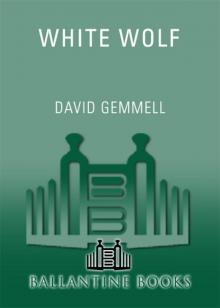 White Wolf
White Wolf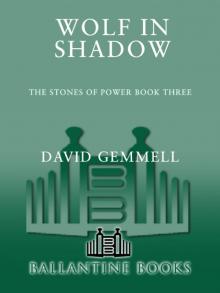 Wolf in Shadow
Wolf in Shadow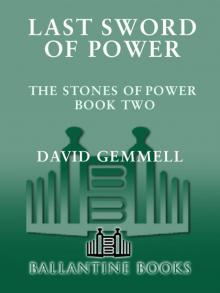 Last Sword of Power
Last Sword of Power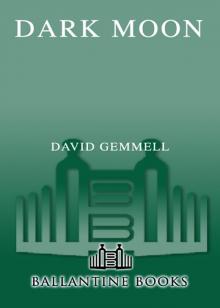 Dark Moon
Dark Moon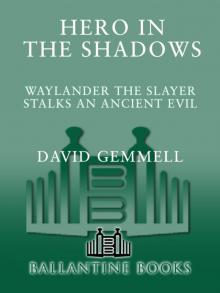 Hero in the Shadows
Hero in the Shadows Gemmell, David - Drenai 09 - Hero In The Shadows
Gemmell, David - Drenai 09 - Hero In The Shadows Waylander
Waylander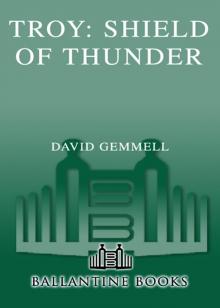 Shield of Thunder
Shield of Thunder Stormrider Stormrider
Stormrider Stormrider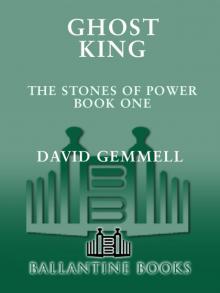 Ghost King
Ghost King Legend
Legend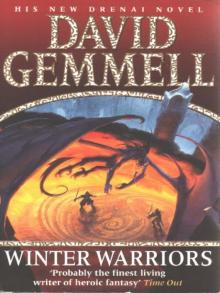 Winter Warriors
Winter Warriors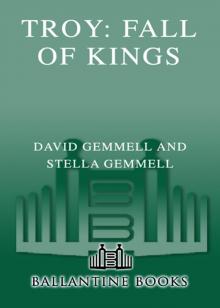 Fall of Kings
Fall of Kings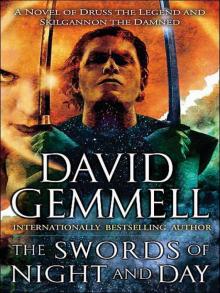 The Swords of Night and Day
The Swords of Night and Day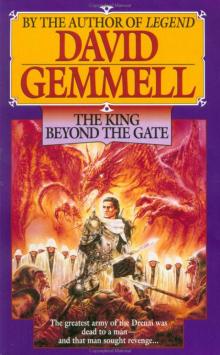 The King Beyond the Gate
The King Beyond the Gate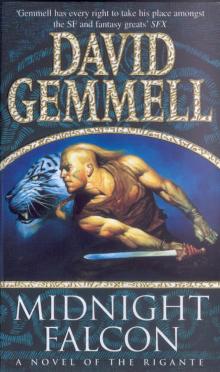 Midnight Falcon
Midnight Falcon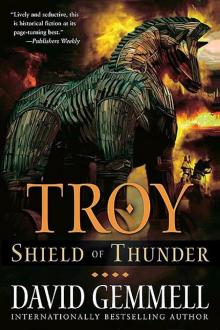 02 - Shield of Thunder
02 - Shield of Thunder In the Realm of the Wolf
In the Realm of the Wolf Ravenheart
Ravenheart The First Chronicles of Druss the Legend
The First Chronicles of Druss the Legend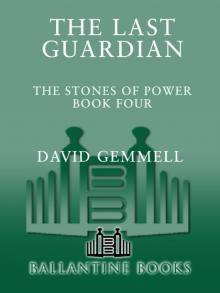 Last Guardian
Last Guardian Stormrider
Stormrider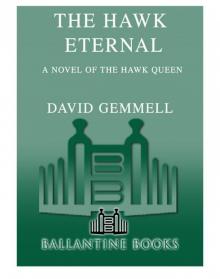 The Hawk Eternal
The Hawk Eternal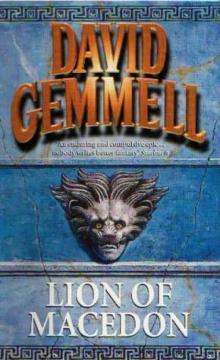 Lion of Macedon
Lion of Macedon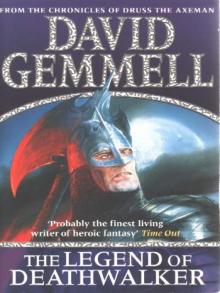 The Legend of Deathwalker
The Legend of Deathwalker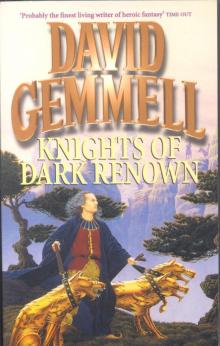 Knights of Dark Renown
Knights of Dark Renown Echoes of the Great Song
Echoes of the Great Song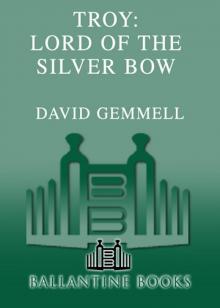 Lord of the Silver Bow
Lord of the Silver Bow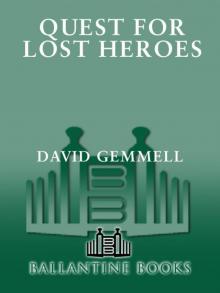 Quest for Lost Heroes
Quest for Lost Heroes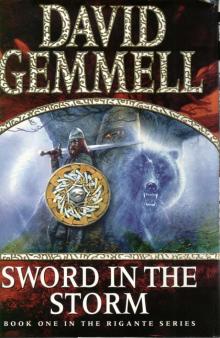 Sword in the Storm
Sword in the Storm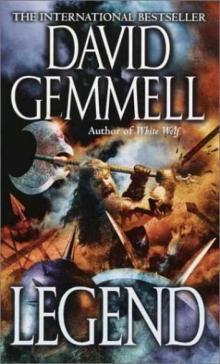 Drenai Saga 01 - Legend
Drenai Saga 01 - Legend White Knight/Black Swan
White Knight/Black Swan![[Troy 02] - Shield of Thunder Read online](http://i1.bookreadfree.com/i/03/19/troy_02_-_shield_of_thunder_preview.jpg) [Troy 02] - Shield of Thunder
[Troy 02] - Shield of Thunder Lord of the Silver Bow t-1
Lord of the Silver Bow t-1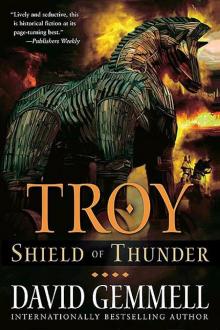 Shield of Thunder t-2
Shield of Thunder t-2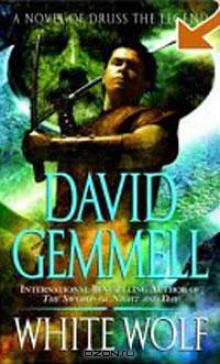 White Wolf: A Novel of Druss the Legend dt-10
White Wolf: A Novel of Druss the Legend dt-10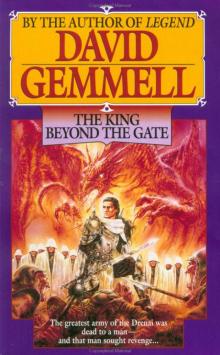 Drenai Saga 02 - The King Beyond the Gate
Drenai Saga 02 - The King Beyond the Gate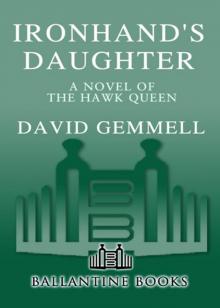 Ironhand's Daughter
Ironhand's Daughter Gemmell, David - Drenai 06 - The First Chronicles of Druss the Legend
Gemmell, David - Drenai 06 - The First Chronicles of Druss the Legend The Last Guardian
The Last Guardian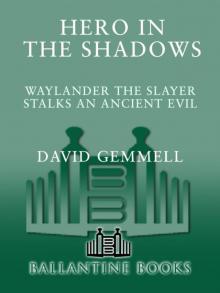 Hero in the Shadows: A Waylander the Slayer Novel
Hero in the Shadows: A Waylander the Slayer Novel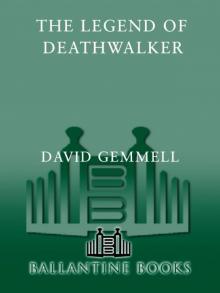 The Legend of the Deathwalker
The Legend of the Deathwalker